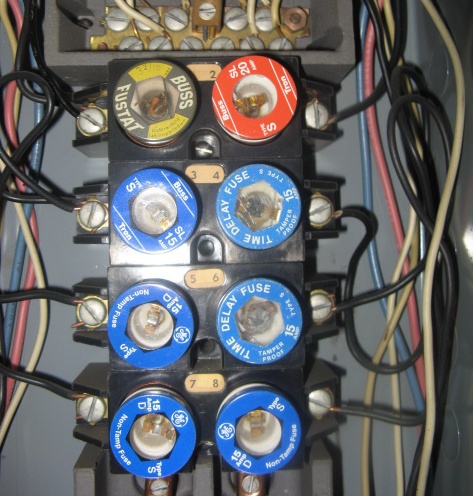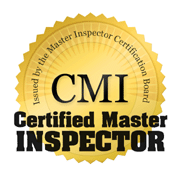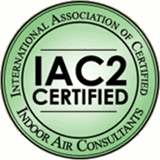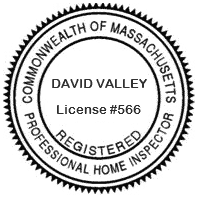Massachusetts Home Inspections YOUR INVESTMENT IS MY CONCERN

Fuses

Electrical Fuse Panels: Screw-in type fuses in the electrical distribution panels were in common usage until the mid 1950s. Fuses, although inherently safer than circuit breakers, afford the ill-informed occupant to replace a properly sized fuse with one which is too large. This can result in a circuit overload and a fire hazard.
Located inside of your home is a fuse box that contains a fuse for each of your home's circuits. A fuse provides protection for each of your electrical circuits by stopping the flow of current if an overload or fault occurs. When an electrical short occurs or the load on your circuit becomes too great, the fuse on that circuit burns out and breaks the circuit; this is what is referred to as a "blown fuse."
HOW TO CHANGE A FUSE
Before electricity can be restored, the fuse must be replaced with a new fuse. However, even before you replace the fuse, you must take steps to ensure that it is safe to do so. Turn off or unplug all of the devices that are plugged into the circuit. Make certain that no dangerous condition exists before restoring power.
Replace the fuse with a fuse that is of the proper rating for the circuit. For instance, if the circuit is rated for 15 amps, use a 15 amp fuse. Never use anything other than a fuse of the proper rating. I recommend that you install "Fuse Stats" or "Type S" inserts at all fuse sockets which will only allow the correct size fuse to be installed and prevents over fusing of any circuits.
When removing or inserting a new fuse, NEVER touch the metal parts of the fuse. If your fuse box is equipped with a master switch to cut power to the fuse box, cut the main power prior to replacing the fuse.
Electricity should now be restored to the circuit. If the fuse blows again before you have turned anything on or plugged anything in, a serious wiring fault may exist. Consult a qualified licensed electrician immediately. If the fuse blows after plugging in or turning on a device, then that particular device may have a short or may be placing too much of a load on that particular circuit.
If no fuses were blown and you still do not have power at an outlet, make certain that the switch, if any, that controls the outlet is turned on. If you can find no problem, the outlet, switch, wiring or some other component may be at fault. Also, the outlet may be on a GFCI branch circuit. Refer to the section on GFCIs for checking a GFCI outlet.
Here is what my clients have to say about my home inspection services:
Press F5 (on your keyboard) for additional testimonials
Hi Dave,
I just wanted to write a quick thank you for your work inspecting 43 1/2 Bartholomew Street in Peabody yesterday. As a buyer in the process of trying to purchase my first home, it's been difficult to know who to trust. I honestly cannot believe some of the stuff I've run into, so I had to write & let you know that I found you professional, competent, & all around above par. In all of the people I've had to deal with up to this point, you were one of the few that actually took the time to explain things in a way that an inexperienced first time home buyer would understand. I never once felt rushed or talked down to.
Based on your inspection, I've decided not to purchase the home at 43 1/2 Bartholomew Street. I will however, continue to look & will hopefully find a house more suited to my needs in the near future. When that happens I will be calling on your expertise once again. In the meantime, I will certainly recommend you to any of my family & friends that may need a home inspection.
Thanks again,
Lisa G.














